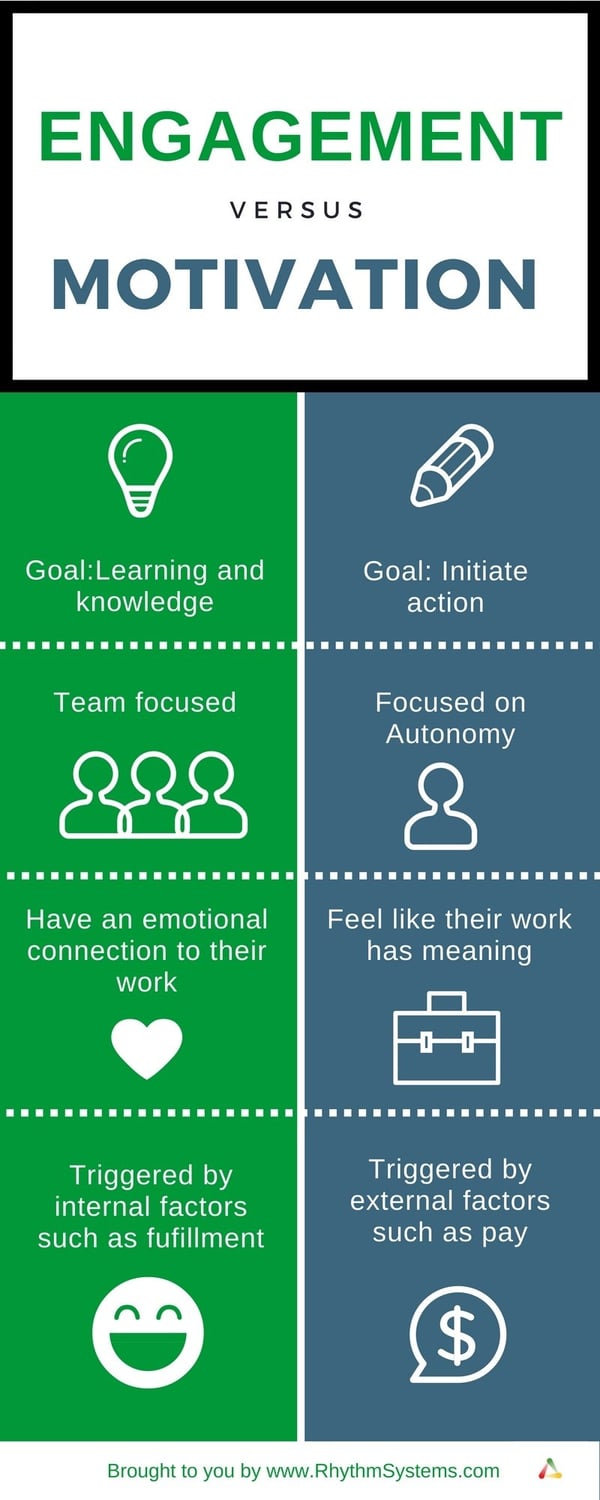In working with middle-market CEOs and their employees they often wonder about their employee productivity and professional development. I often find that they overlook one of the most significant components of productivity: are your employees engaged or motivated? The team members may be encouraged by a bonus, and they will be productive, but if a team member is also involved with their work - and its purpose - they are almost a third more productive. Let's talk about employee motivation and engagement, as they are different. Measuring engagement levels and, in turn, your business's increased employee retention rate to minimize costs and frustration!
As an employer, you want your workforce to be engaged and motivated. According to Gallup, with employee engagement at around 15% worldwide and 34% in the United States, it is essential to know the difference between employee engagement and motivation. Engaged employees will decrease your turnover rate, and you'll have much happier and longer-tenured employees! This reduces training and recruiting costs to help the bottom line over the long term.
Engagement is an active agreement to do something for someone. Motivation is the will to do something. Both are critical to creating high-performance teams, but employee motivation and engagement are two different things, and both are critical in building a great team. Highly engaged teams actively seek ways to increase their productivity and help the team hit its goals. What are the drivers of engagement at your workplace? The most common ones are purpose, role clarity, meaning, shared values, trust, fairness, and relationship with your manager.
How do you know if you have a highly motivated, engaged workforce? We all know that on some days, it is hard to find motivation at work, and your level of engagement can vary from day to day. Still, you'll generally notice the difference between engaged and motivated workers. Check out the examples below to see the difference between intrinsic motivation at work and employee engagement. You'll find a strong relationship between motivation and employee engagement. Individual employees want to go to a workplace where they are engaged! Nobody wants to stay at a job or go to a new one where nobody is engaged in their work.
Employee Motivation and Engagement Examples:
1. Employees have an emotional commitment to their work. (Engagement)
2. Employees feel like their work is meaningful. (Motivation)
3. Employees continually learn and seek knowledge. (Engagement)
4. Employees take the initiative on tasks and projects. (Motivation)
5. Employees are persistent in their personal and company goals. (Engagement)
6. Employees are working towards a bonus. (Motivation)
7. The team is working towards a common goal. (Engagement)
If you're a visual person, here's an infographic illustrating the differences between engagement and motivation:

Employee Motivation and Engagement Strategies:
1. Make sure you have complete clarity with your team so they know what goals they are working towards.
2. Celebrate improvements and accomplishments. Make sure your team knows they are appreciated!
3. Set realistic goals using Red-Yellow-Green success criteria.
4. Encourage your team to learn and improve their skills continuously.
5. Engage your team in annual planning and quarterly planning sessions. Your team will be more motivated when they help create the plan they are now executing.
6. Communicate, communicate, communicate! During your weekly staff meeting, encourage constructive conversation. Encourage feedback from all employees.
7. Different personalities work better in different environments. Consider different personality styles and preferences as you engage and motivate team members.
8. Work on the employee experience. Think of everything from parking to the coffee you serve in your break room. Does it welcome the employee?
9. Measure employee satisfaction at least twice a year. Engagement surveys give you a pulse of your engagement culture at any moment. Ensure you meet with your human resource team, team managers, and executive team to define employee engagement properly.
10. Create a culture from the CEO on down for a leadership accountability culture. It starts at the top, and you need to develop your leaders with time and money for training.
11. Change the mindset of your leadership team from "boss" to "coach." You should be providing constant feedback to your employees. Team members must also have role and goal clarity with their job scorecards.
To learn more about employee engagement, check out our Employee Engagement Resource Center or download our Return on Payroll of Engaged Employees white paper, which is chock-full of significant research and success stories! Good luck motivating and engaging your team!
Employee Engagement Examples
- Employees actively participate in team meetings and discussions, contributing their ideas and feedback.
- Employees feel a sense of pride and ownership in their work, often going above and beyond their job requirements.
- Employees are enthusiastic about their work and the mission of the company.
- Employees are willing to help their colleagues and work collaboratively towards shared objectives.
- Employees are proactive in identifying and solving problems rather than waiting to be told what to do.
Employee Motivation Examples:
- Employees are driven by the opportunity for career advancement within the company.
- Employees are motivated by recognition and praise for their work, not just monetary rewards.
- Employees are inspired by challenging tasks that push them to learn and grow.
- Employees are motivated by a healthy work-life balance, which includes flexible work hours or remote work options.
- Employees are driven by a positive company culture that values diversity, inclusivity, and employee well-being.
These examples illustrate the different ways in which employees can be engaged and motivated at work. While engagement is about an employee's emotional commitment and involvement with their work and the company, motivation drives an employee to perform and excel at their tasks. Both are crucial for a productive and positive work environment.





